June 18, 2025 | 04:36 GMT +7
June 18, 2025 | 04:36 GMT +7
Hotline: 0913.378.918
June 18, 2025 | 04:36 GMT +7
Hotline: 0913.378.918
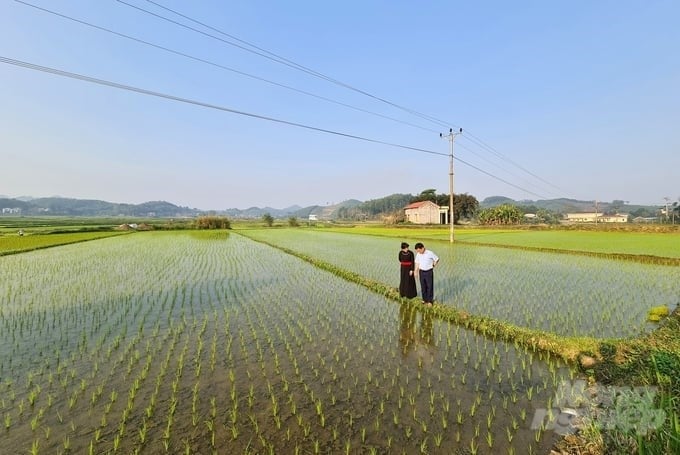
The On Luong vai sticky rice field is hundreds of hectares wide. Photo: Dao Thanh.
We went to On Luong commune (Phu Luong district, Thai Nguyen province) when the vast fields were covered with a green of On Luong vai sticky rice. In recent years, people have been aware of the restoration of their ancestors' traditional vai sticky rice area to hand down the original culture. From that original culture, it becomes a commodity product, raising income and feeding people. This sticky rice variety is called "vai" because when it is ripe, its grain is red like ripe lychee.
Ms. Nguyen Xuan Hue, Deputy Director of On Luong Vai Sticky Rice Agricultural Cooperative, welcomed us with a cup of wine soaked in fragrant young vai sticky rice ears. That scent brought us closer to her story of hardship in preserving the precious sticky rice variety.
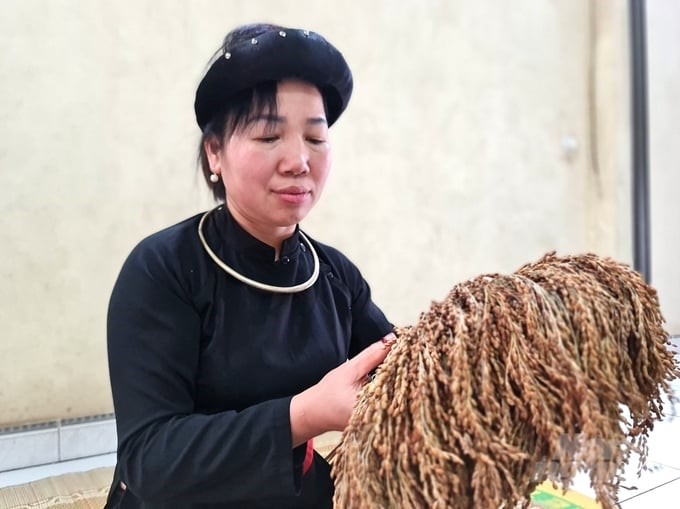
Ms. Nguyen Xuan Hue, Deputy Director of On Luong Vai Sticky Rice Agricultural Cooperative. Photo: Dao Thanh.
Ms. Hue said that her hometown's sticky rice was delicious, but there was a time when it was not saleable. Many households have abandoned their fields to work as workers in Thai Nguyen city and surrounding areas. She was sad to see rice seeds not sown in the fields but left hanging in the kitchen upstairs, and the fields overgrown with grass.
Going to village and commune meetings, she heard district and provincial officials say that such a delicious type of sticky rice in Thai Nguyen is very rare, and keeping the delicious rice variety not only preserves the seed but also preserves the cultural roots of the village. Thus, she and the cooperative members were determined to plant and restore that precious rice variety. Thanks to the passion that penetrates deep into her, On Luong vai sticky rice fields stretching from the bamboo fence at the beginning of the village to the national highway are all lush green.
According to Ms. Hue, the cooperative’s biggest advantage is that participating in fair booths in the province and neighboring provinces is free. Therefore, she has approached many potential customers, and many customers have ordered tons of rice from the cooperative. She realized that her ancestors’ sticky rice variety could be sold and do business instead of abandoning the fields and losing the good rice varieties that the ancestors had passed down for generations.
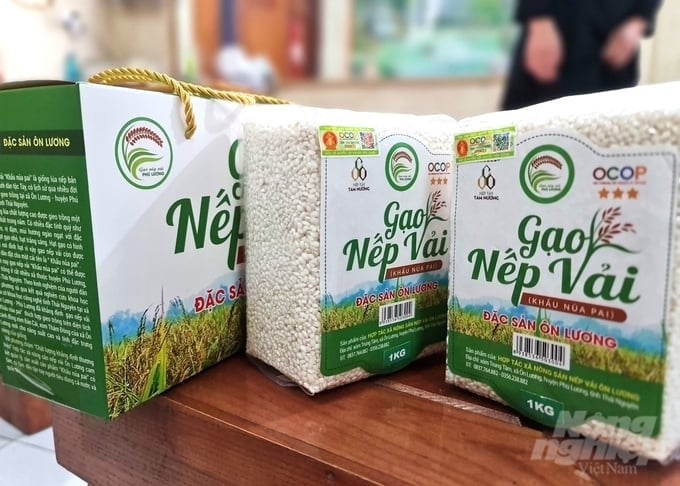
On Luong vai sticky rice is a famous specialty sticky rice type in Phu Luong district and Thai Nguyen province. Photo: Dao Thanh.
The hard work and determination of Ms. Hue and cooperative members are compensated by high prizes for cakes made from her village's vai sticky rice at competitions inside and outside the province. When On Luong vai sticky rice had a brand and achieved OCOP stars, its price increased from VND 20,000–25,000/kg to 50,000 VND/kg. In 2023, the cooperative purchased and exported about 20 tons of vai sticky rice to the market.
In the last four years, every year the fields in On Luong have been planted with the vai sticky rice variety. Villagers sow rice seeds at the beginning of lunar April and plant rice seedlings in June. Hundreds of hectares of rice fields are fertilized with organic fertilizer and are not sprayed with chemicals. Because if farmers spray, they will not be able to get young rice ears (called "dong") to soak up dong wine in early September.
Thanks to the sale of dong wine, some households earn tens of millions of dong per acre (1 acre equals 0.036 ha). By mid-September, On Luong had entered the season of green rice, with a famous and delicious green rice variety that brings people an income of about VND 4.5 million/acre. At the beginning of October, when the rice is ripe with lychee color and also the time of full harvest, the average income reaches VND 2 million/acre.
Ms. Hue said that strenuous efforts also helped the price of vai sticky rice increase, thereby helping the village cling to fields, and fields preserve the variety for the village. That is the biggest value for the Tay people who love their village.
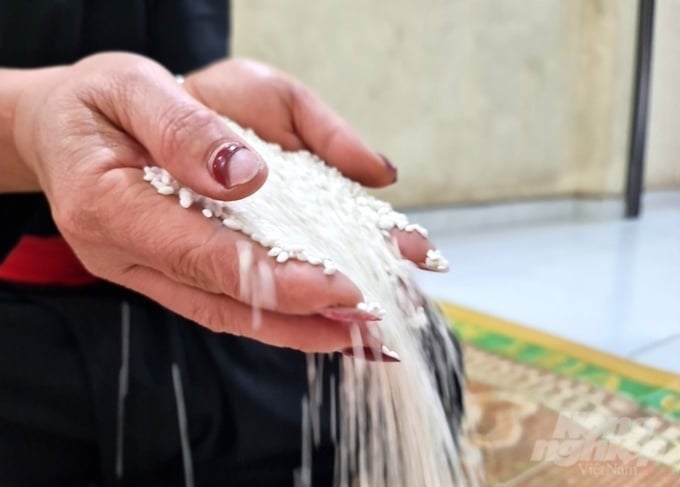
On Luong vai sticky rice has very durable flexibility and fragrance. This is the raw material that makes the quite famous Bo Dau Chung cake and On Luong round sticky rice cake. Photo: Dao Thanh.
The flavor of On Luong vai sticky rice is forever remembered through five-color sticky rice dishes or flexible and fragrant Chung cakes. And the ancient organic tea in On Luong is also missed by everyone.
Mr. Tong Van Vien, Director of Phu Luong Agricultural Cooperative, welcomed us into the newly-built Tay people’s traditional stilt house. He built that house so that the young generation like him and after him could remember the soul of the Tay people. With the same concept, over the years he has kept the ancient organic tea terraced fields as if holding on to the cultural essence of the mountains and forests.
The taste of the tea Mr. Vien poured for me was very special, lightly fragnant, and slightly greasy, along with a sweet aftertaste. A colleague of mine who has been attached to and enjoyed tea from Thai Nguyen all his life said that Mr. Vien's tea has the smell of Tan Cuong tea but is a bit strange; paying close attention will see it. Mr. Vien nodded, because during his 20 years of making tea, he had a period of being attached to the Tan Cuong specialty tea region.
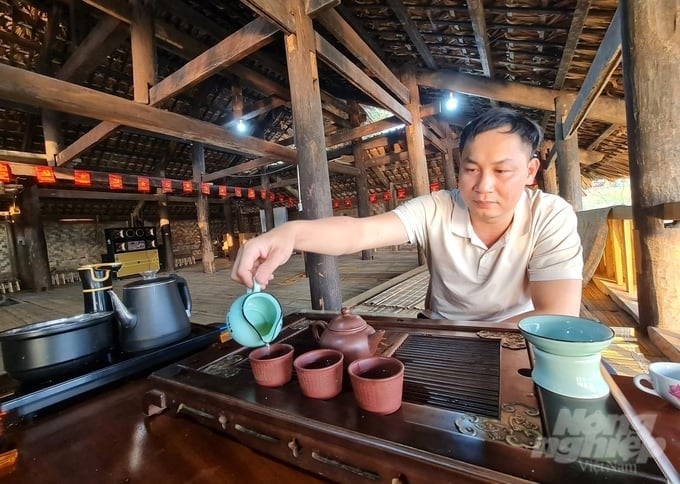
Mr. Tong Van Vien, Director of Phu Luong Agricultural Cooperative. Photo: Dao Thanh.
The difference that creates the distinct quality of On Luong tea lies in the fact that all organic fertilizers are self-made by Phu Luong Agricultural Cooperative, so the cooperative can be proactive in composting raw materials and rates to fertilize tea with enough nutrients, thereby creating the most delicious type of tea.
Mr. Vien said that types of tea, such as morning dew sprout tea, which costs several million dongs per kilogram, require more elaborate care, harvesting, and processing. Raw materials for that type of tea must be taken from organic tea gardens that are 20 years old or older and must be picked at 5-8 a.m., when the morning dew has not yet melted away.
Explaining the reason for his determination to make organic tea despite many hardships, Mr. Vien said that the tea hills have been fertilized with inorganic fertilizers and sprayed with chemicals for many years, causing the soil to gradually deteriorate and the tea to lose its nutrition. The tea quality decreases, and the old tea color and taste are lost. Because of their desire for money, many people add flavorings and by-products to tea.
People's hasty needs for productivity and livelihood have made the land infertile and damaged. Therefore, he thought he had to do something different and could not continue to destroy the soil. Since 2015, he has been determined to heal the soil and pursue organic farming methods.
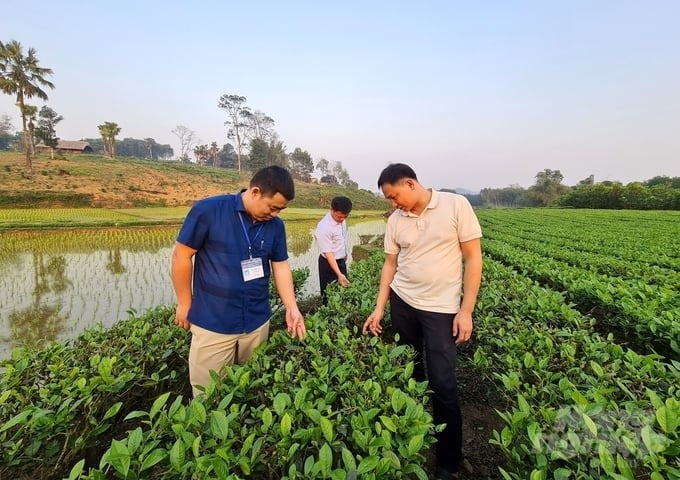
20-year-old organic tea area of Phu Luong Agricultural Cooperative. Photo: Dao Thanh.
To make organic tea, Mr. Tong Van Vien's cooperative established a separate workshop to collect manure, agricultural by-products and wastes, and biological products, decompose them, and then fertilize the tea garden and rice. The cooperative has agricultural engineers closely working with households, advising people on safe tea farming techniques according to an organic direction in the linked areas. The cooperative provides organic fertilizers and biological products to farmers and ensures product consumption. Currently, the cooperative's raw tea area has 70 hectares produced according to VietGAP organic standards.
After more than 10 years of working in agriculture, Phu Luong Agricultural Cooperative has a brand and a position in the market. Currently, the cooperative produces about 100 tons of tea per year, supplying markets in Thai Nguyen, Bac Giang, and 20 Northern provinces and cities.
The cooperative has three tea products that have achieved OCOP 4 stars. Because of the advantage of organic farming, the cooperative is also the only unit with two tea products selected for the 5-star OCOP exam in Phu Luong district in 2024, including Huong Que fish hook tea and Huong Que Tom Non tea.
Translated by Huyen Vu Thu
/2025/06/17/3942-2-143243_548.jpg)
(VAN) Recently, in Sweden, the Secretary of the Binh Dinh Provincial Party Committee presented the Investment Registration Certificate for the 'Polyester Fabric Recycling Complex' project to SYRE Impact-AB Company.
/2025/06/12/3721-2-202745_83.jpg)
(VAN) TH made an impression at Seoul Food 2025 with its line of natural beverages, paving the way for Vietnamese food products to enter the South Korean market.

(VAN) Soc Trang's success in rice exports stems from a strategy of developing fragrant and specialty rice cultivation areas and standardizing production toward low-emission practices.
/2025/06/11/1311-5-120811_839.jpg)
(VAN) The pig farming industry is facing the challenge of comprehensive restructuring to meet requirements for quality, safety, traceability, and market expansion both domestically and for export.

(VAN) Vietnam considers participating in ALGROALBA in order to expand agricultural production, coordinate the assessment and effective exploitation potential land.
/2025/06/05/5314-1-184727_407.jpg)
(VAN) From seemingly worthless fish scales and skin, enzymes and lactic ferments can transform by-products into peptides, opening a sustainable, effective business direction and elevating Vietnamese seafood.

(VAN) TTC AgriS and IFC signed a strategic partnership to develop a sustainable agricultural value chain, aiming to achieve the Net Zero target by 2035.